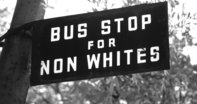
A Reporter in Black Politics
In declaring his intention to disrupt the May 1961 Republic Day celebrations, Mandela made himself a target for government attack. But first they had to find him and this became a top priority for the police. They scoured the country, but Mandela eluded them and became known as the 'Black Pimpernel', after the famous Baroness Orczy fictional character.
Yet he did not resort to any great disguises. He was sheltered by supporters and held meetings in secret to further the stay-at-home. As a reporter who was by now specialising in black politics, I was seeing him whenever I wanted to, or whenever he wanted to speak to me.
The only other reporter with this access was the late Charles Bloomberg of the Sunday Times, who later left the country because of his justifiable fear of the consequences after writing a report exposing the Afrikaner Broederbond, the sinister organisation which pulled government strings from behind the scenes. Mandela and I sent messages to each other when either of us wanted to meet.
The regular venue was the home in the suburb of Fordsburg of Adelaide and Paul Joseph, members of the Transvaal Indian Congress. Or else we met at night in a quiet street nearby: I would park in a dark spot and he would appear. His only disguise was to wear worker's overalls, which did nothing to conceal his imposing presence.
We sat in my car and talked about what he was doing. To ensure a flow of news for publication, we arranged that I would be at my desk at the Mail at 5:00 p.m. each day. Whenever necessary, a phone call would come in and a voice would read an Action Council statement to me. It was never Mandela, but others who phoned, and sometimes I recognised the voice of a friend.
Closing of a Chapter
Again, the history is that the protest failed. Government intimidation and show of force and threats did the job. South Africa went onto a new track. My personal memory of Mandela is of two of his responses at the time. The first came on the morning of the strike: the Rand Daily Mail rushed out a special edition to get to the streets by 8:00 a.m.
The strike was not a success; nor was it a total failure. Perhaps 50 per cent of workers responded. But the Mail, in its haste, accepted the word of government and municipal officials and declared that the strike had flopped. The Mail was viewed with such respect by blacks that its banner headline ended whatever hope the strike might yet have had of succeeding. I was sitting at my desk, feeling miserable and angry over what we had done when Mandela phoned.
I began to stutter an apology but he cut me off and said he knew it was not my fault. I was overwhelmed by the generosity of spirit from a man who had spent months putting his life on the line for his cause, who had sacrificed family and career for it, and yet who now evinced not a hint of bitterness or despair. When he phoned again that night, I was profoundly impressed by his honesty.
There was no attempt to gloss over what had happened or to put a spin on events in the way that politicians usually did. Instead, he said to me frankly, 'The people did not respond to the stay-at-home to the extent to which we expected them to do.' He went on to say, 'We are not disheartened.
This is not the end of the matter ... ' An hour later he phoned again, apparently, in response to the questions I had put to him about his future intentions, and gave the first fateful announcement of a switch to armed resistance. He spoke of the 'closing of a chapter' and said, 'I don't think, speaking for myself, that I can continue speaking peace and non-violence in the light of the methods adopted by the government to suppress our peaceful protest.
 Mandela's charisma seldom reveals itself in set speeches....
Mandela's charisma seldom reveals itself in set speeches.... All his life President Mandela has been in training for the leadership role he plays today. Nelson Rolihlahla Mandela (in Xhosa, Rolihlahla ...
All his life President Mandela has been in training for the leadership role he plays today. Nelson Rolihlahla Mandela (in Xhosa, Rolihlahla ...